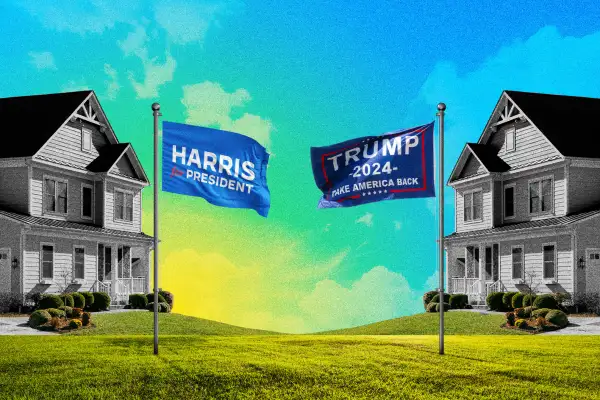Can Your Neighbor’s Trump (or Harris) Flag Lower Your Property Value?

You may not have bought that “Make America Great Again” sign posted up on your next-door neighbor’s lawn, but if you’re looking to sell your house soon, you could end up paying for it.
“We are living in an extremely charged political environment,” says Robert Elson, an agent with Coldwell Banker Warburg. And proximity to neighbors with unfettered political opinions — be it Democrat, Republican or otherwise — can shrink your pool of prospective offers, he says.
A quick scroll through Reddit confirms Elson's sentiments. “I have absolutely passed on a house because I was concerned about the neighbor’s political flags,” one Redditor wrote in a June thread.
In a similar thread three years back, a commenter says they "distinctly recall pulling up to a house with a Blue Lives Matter flag flying next door and [telling] my realtor to just turn back around.”
While these accounts are anecdotal, real estate agents say alienating a significant portion of your buyer pool can lead to genuine challenges: longer time on the market, fewer offers and, eventually, a price cut.
At a time when most Americans feel fatigued by the current political climate and, often, financially strained, that’s no small matter.
How your neighbors (and their politics) impact your home value
The exact financial impact of a neighbor’s divisive political sign is hard to pin down. A “bad neighbor” — one with an unkempt yard, loud music or pesky animals, for example, can reduce your home’s value by 5 to 10%, according to the Appraisal Institute. There isn’t hard data relating to a neighbor’s political decor specifically, but real estate pros say it could have a similar effect.
“It can greatly impact the property’s value, unfortunately,” says Sean Adu-Gyamfi, a real estate broker with Coldwell Banker Warburg. “The homebuying process is incredibly emotional, and buyers want to know their neighbors don’t have extreme views or have values that may differ from them.”
Large, garish or particularly divisive signs — confederate flags, for instance, or signs with vulgar language — can be especially challenging for buyers and sellers to contend with. The same goes for signs that broadcast a political stance in direct opposition to the general leanings of the community.
“If you’re a staunch Republican in a largely liberal area, or vice versa, then a neighbor’s sign might be a turnoff,” says Maureen McDermut , a real estate agent with Sotheby’s International Realty. “I wouldn't have said this 10 years ago, but the political climate in the U.S. has changed and it can now impact major decisions. Some might decide not to buy a home in an area where their neighbor might be ‘on the other team.’"
McDermut says she’s had clients on both sides of the aisle refuse to live next door to supporters of certain candidates. Susan Thayer, an agent with The Thayer Group, has had similar experiences.
“It’s hard to keep a buyer on track during their viewing when there may be a political sign or item that triggers emotion,” Thayer says. “I have personally taken buyers to homes that had a next door neighbor’s home decorated with ‘XYZ for president’ banners. They were affected during the entire home tour, repeating over and over about the neighbors they would not like to live next to.”
Ultimately, agents say, a neighbor’s provocative signs can cause a home to sit on the market longer. This could lead to lower-priced offers or even an eventual price reduction, netting fewer proceeds for the seller. For context, data from Zillow shows that just two extra months on the market can cause a 5% reduction in sale price — or on today’s median-priced home, the loss of about $20,650.
Should you sell your house in an election season?
Election season tends to bring uncertainty, which can make people hesitant to pull the trigger on big financial decisions (including buying or selling real estate). Fortunately, experts say, that hesitancy is largely misguided — even if the political signs in your neighbor’s yard are causing you some concern.
“While the conventional wisdom is that an election year is a bad time to sell a home, the data really doesn't back that up,” McDermut says. “Going back to the Reagan years, you can see home values appreciating at higher rates during election years, specifically since 2012.”
Pricing downturns have occurred in some election years, but those instances are rare and typically align with broader economic trends. In 2008, the real estate market was on the tail-end of the housing market crash, which itself was part of a larger financial crisis. In 1992, the country was just starting to recover from a recession.
“People buy homes based upon need and desire and what politician wins or loses should have very little impact for the vast majority of homebuyers,” says Mason Whitehead, branch manager at Churchill Mortgage. (Heavily political markets like Washington, D.C. may be the exception, he says).
If you do opt to sell your home this year and your neighbor’s questionable front-yard decor is stressing you out, it might be worth talking to them about your concerns. And even if they’re unsympathetic, try not to get discouraged, McDermut advises.
“A home truly sells on its merits,” he says. “If you do the right things in terms of staging and marketing the home well, then you shouldn't have a major issue.”
More from Money:
The Typical Down Payment on a Home Has Jumped 15% Since Last Year
Where Do Donald Trump and Kamala Harris Stand on Social Security and Medicare?
These 20 Places Have the Lowest Property Taxes in the Country

